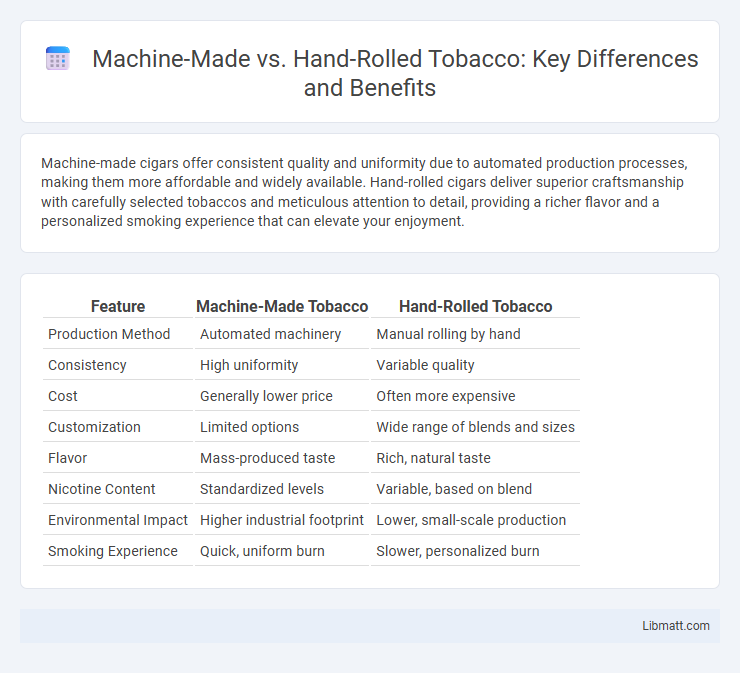Machine-made cigars offer consistent quality and uniformity due to automated production processes, making them more affordable and widely available. Hand-rolled cigars deliver superior craftsmanship with carefully selected tobaccos and meticulous attention to detail, providing a richer flavor and a personalized smoking experience that can elevate your enjoyment.
Table of Comparison
| Feature | Machine-Made Tobacco | Hand-Rolled Tobacco |
|---|---|---|
| Production Method | Automated machinery | Manual rolling by hand |
| Consistency | High uniformity | Variable quality |
| Cost | Generally lower price | Often more expensive |
| Customization | Limited options | Wide range of blends and sizes |
| Flavor | Mass-produced taste | Rich, natural taste |
| Nicotine Content | Standardized levels | Variable, based on blend |
| Environmental Impact | Higher industrial footprint | Lower, small-scale production |
| Smoking Experience | Quick, uniform burn | Slower, personalized burn |
Introduction to Machine-Made and Hand-Rolled Products
Machine-made products offer high precision and uniformity, produced using automated processes that ensure consistent quality and faster output. Hand-rolled items emphasize craftsmanship and individuality, with skilled artisans carefully shaping each product to preserve traditional techniques and unique characteristics. The choice between machine-made and hand-rolled depends on the balance between efficiency, consistency, and artisanal quality desired by consumers and manufacturers.
Defining Machine-Made and Hand-Rolled Techniques
Machine-made cigars are produced using automated equipment that assembles tobacco leaves quickly and uniformly, ensuring consistent size and shape. Hand-rolled cigars involve skilled artisans manually selecting, blending, and rolling each tobacco leaf with precision to create unique, high-quality products. Understanding these distinct manufacturing techniques helps you appreciate the craftsmanship and characteristics that differentiate each cigar type.
Materials Used: Machine vs. Hand Processes
Machine-made cigars typically use homogenized tobacco leaf (HTL) or chopped tobacco mixed with binding agents, providing uniformity and lower production costs. Hand-rolled cigars use whole tobacco leaves sourced from specific regions, allowing for unique flavor profiles and better structural integrity. The manual process ensures precise selection and layering of filler, binder, and wrapper leaves, enhancing quality and complexity.
Production Speed and Scalability Comparison
Machine-made cigars offer significantly faster production speeds, with automated processes producing thousands of units per day, ideal for large-scale distribution. Hand-rolled cigars require skilled artisans, limiting output to a few hundred per day, which impacts scalability but preserves quality and unique craftsmanship. Your choice depends on whether you prioritize mass availability or bespoke quality in cigar production.
Consistency and Quality Control
Machine-made products ensure high consistency and precise quality control through automated processes and standardized settings, minimizing human error. Hand-rolled items exhibit natural variations, which can lead to unique characteristics but may compromise uniformity and overall quality assurance. Your preference depends on whether you prioritize consistent standards or artisanal authenticity.
Cost Analysis: Affordability and Value
Machine-made cigars typically offer greater affordability due to mass production lowering manufacturing costs, making them accessible for budget-conscious smokers. Hand-rolled cigars involve skilled craftsmanship and premium materials, driving higher prices but often delivering superior flavor and quality, enhancing long-term value for enthusiasts. Assessing your preference between immediate cost savings and nuanced smoking experience helps determine the best investment in cigars.
Artisan Skill vs. Industrial Precision
Artisan skill in hand-rolled products brings unique textures and subtle imperfections that highlight craftsmanship, while machine-made items deliver consistent quality through industrial precision and advanced technology. Your choice influences whether you value the nuanced individuality of handcrafted work or the uniformity and efficiency of machine production. Each approach offers distinct advantages depending on preferences for authenticity or scalability.
Environmental Impact: Sustainability Concerns
Machine-made products typically have a higher environmental footprint due to increased energy consumption and industrial waste, whereas hand-rolled items often utilize more sustainable, biodegradable materials with minimal processing. The scalability of machine production leads to resource depletion and pollution, contrasting with the artisanal approach that emphasizes renewable resources and reduced carbon emissions. Sustainability concerns favor hand-rolled goods for their lower ecological impact and support for eco-friendly manufacturing practices.
Consumer Perception and Market Trends
Consumers increasingly perceive hand-rolled products as premium due to their artisan craftsmanship and perceived quality, influencing their willingness to pay higher prices. Market trends show a growing demand for hand-rolled items in niche segments, driven by interest in authenticity and traditional production methods. Conversely, machine-made products dominate mass markets with consistent quality, affordability, and widespread availability, appealing to cost-conscious consumers.
Choosing Between Machine-Made and Hand-Rolled Products
Choosing between machine-made and hand-rolled products depends on your preference for consistency versus craftsmanship. Machine-made items offer uniform quality and faster production, ideal for those seeking reliable and affordable options. Hand-rolled products showcase artisanal skill and unique variations, appealing to individuals valuing tradition and personalized quality.
machine-made vs hand-rolled Infographic

 libmatt.com
libmatt.com